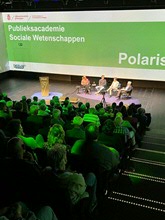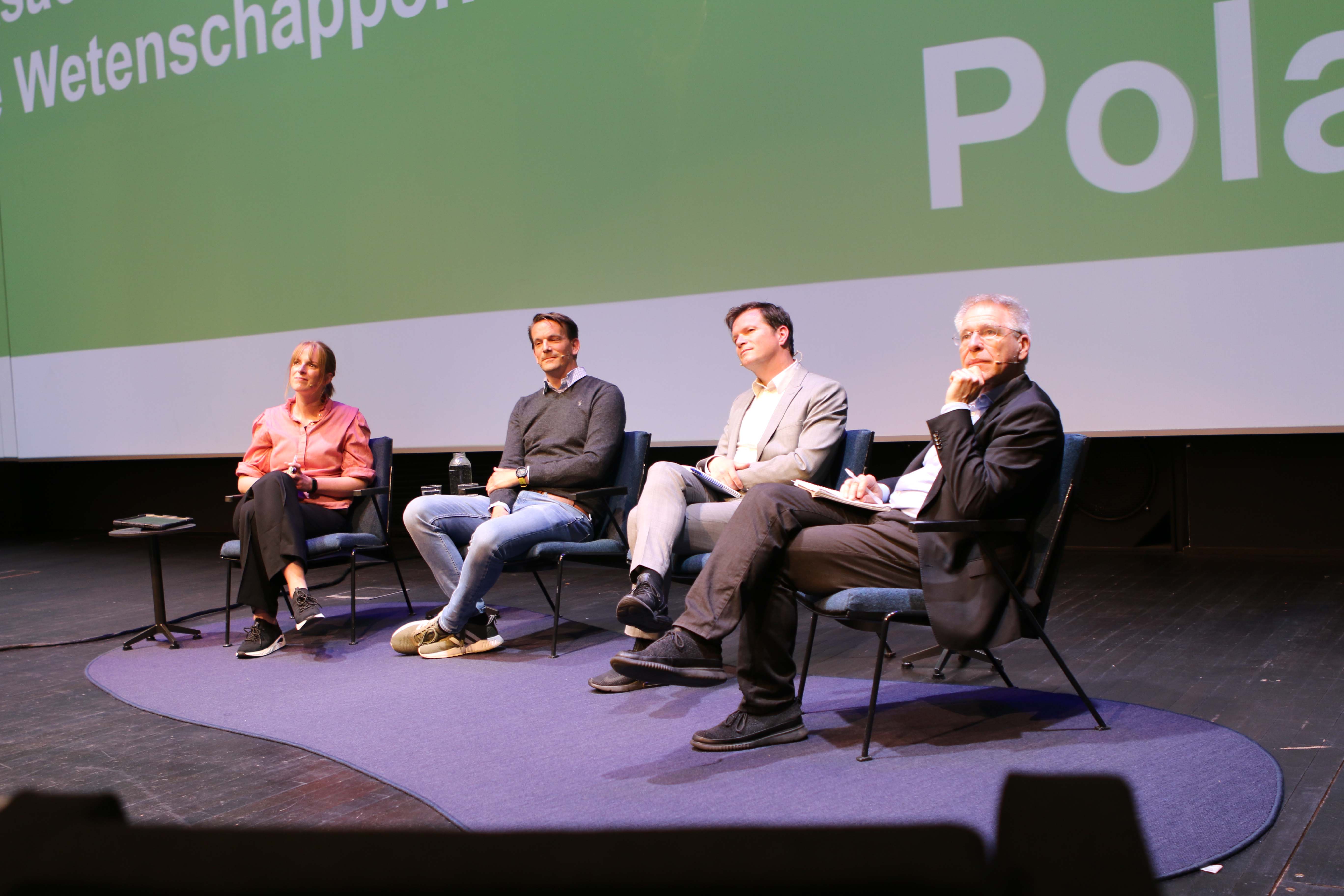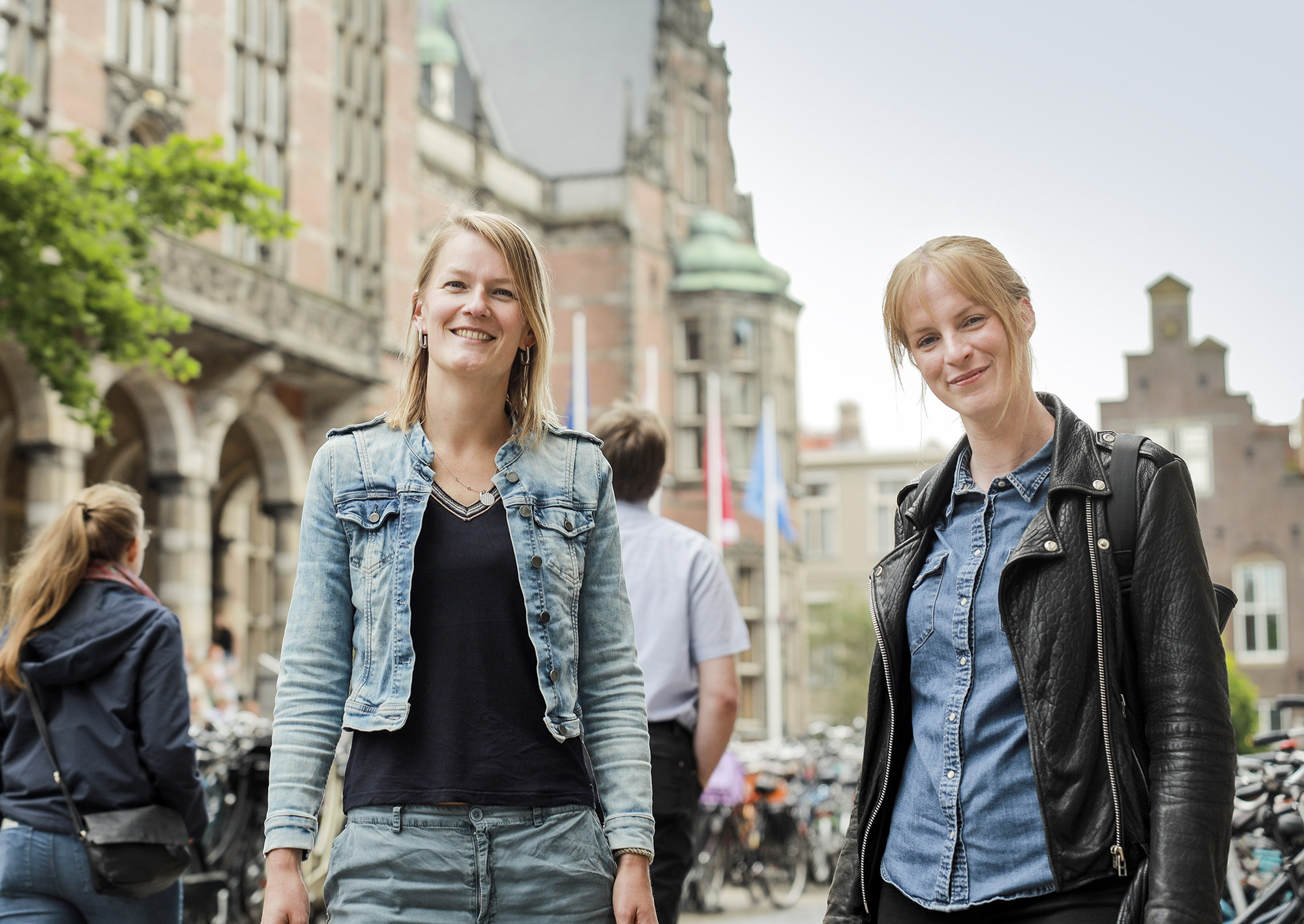Successfully sharing knowledge through the public academies

Polarization, cybercrime, personal injury, sustainable behaviour... These are just some topics of recent public academies. The themed lectures are one example of the many initiatives that have arisen over the past few years to spread knowledge and involve the public more in science. Why do researchers find this important?
Text by Eelco Salverda, Communication Office/Photos by Henk Veenstra
In May, the Faculty of Behavioural and Social Sciences (BSS) organized the first Public Academy on Social Sciences together with regional newspaper Dagblad van het Noorden (DvhN). For years, DvhN has been organizing the Public Academy on Medicine together with the University Medical Center Groningen (UMCG), and the Public Academy on Law together with the Faculty of Law. It is a successful concept to share researchers’ knowledge with people outside the University and to show how researchers are engaged in societal problems and issues. Communication advisors Marije Cnossen (Faculty of Law) and Beau Oldenburg (BSS) —an ‘old hand’ and a ‘rookie’— tell us about their experiences.
It is a Tuesday evening in May. Staff at Forum Groningen, clad in black shirts, direct visitors to the Public Academy upstairs. More black shirt-wearers stand at the entrance to the hall, checking tickets. Inside are cameras, a podium, and a laptop. Staff with badges, headsets, and boom mics walk around in concentration. Only the nervous giggle of organizer Beau Oldenburg reveals that this is the first Public Academy on Social Sciences.
The Faculty of Law has been organizing public academies since 2014, held in the Academy Building. ‘The location was an obvious choice. But it was also a conscious one. The Academy Building is a very attractive and well-known building, but you can’t just walk inside. By organizing the Public Academy here, we would like to give everyone the opportunity to come and take a look’, explains Cnossen. In this way, the University literally and figuratively opens itself up to outsiders. The public academies of BSS, however, are held in Forum Groningen. Why there? Oldenburg: ‘The idea fits in well with the objectives of the Forum, they have good facilities, and they handle part of the publicity. The only thing that we need to think about is the content.’ Still, that is enough work in itself. For instance, BSS carried out street interviews that were posted as a teaser on social media and the website, and they were also shown in a longer format during the evening itself. Cnossen: ‘I found them very appealing, those vox pops. Very fun to watch. They also gave us new ideas.’

A mixed public of young and old slowly fill the darkened hall. ‘Join in!’ is the motto. ‘There are still three seats up there, by the way!’ Oldenburg briefly welcomes the public to this first edition, and explains the aim and structure of the evening.
The example set by the other two public academies was the inspiration for Oldenburg and her colleagues. ‘In our Faculty, too, a lot of research is directly focused on society. And we find it important to share knowledge and inform people, especially in these times of fake news and post-truth. People are perhaps more sceptical about the insights provided by social sciences than they are about other fields. We immediately focused on interaction. We share knowledge, but also really want to lie the emphasis on questions from society.’ At the Faculty of Law, too, there is no lack of topics. Cnossen: ‘Law is so intertwined with our lives. Everyone deals with it if they go through a custody procedure, have to deal with a liability claim, buy a house, or have a will. Sometimes academia seems very distant, but that is not the case. We make this very clear in the public academies. You can also see a trend of academia opening itself up more. Through lectures, festivals, and open science... Researchers find this an important aspect of their work.’
Around the room, an image is projected onto the walls: a balled fist during a demonstration. A reference to the topic of polarization. At another spot, the logo of co-organizer Dagblad van het Noorden is displayed.
The public differs per lecture and is always very mixed, in Cnossen’s experience. Thanks to the collaboration with DvhN, a large number of visitors from outside the University always attend. ‘We usually have around 200 visitors. But for the topic of contested divorce, the room was jam-packed’, says Cnossen. ‘We also told the speakers that there wouldn’t be any lawyers in the room, but instead the general public with no background in law, so they had to take this into account in their presentations.’ ‘That might indeed be more important for your field’, admits Oldenburg. ‘In the field of law, there is always the danger of slipping into jargon.’ BSS was pleased about its first edition: with 220 attendees, the room was full—primarily of visitors who were not affiliated with the University.

Ten minutes after Tom Postmes began his lecture, a rooster starts to crow in the first row. A ring tone? An alarm? A woman sits up startled, rummages around in her handbag, and grabs her phone. The rooster, however, does not seem to be appeased. Postmes carries on unperturbed. After two minutes, he enquires understandingly: ‘Is everything OK there? It’s not bothering me at all.’
A mixed public also evokes mixed responses. Cnossen: ‘Often, the visitors have a problem related to the topic themselves. You can see this reflected in the number of questions. For instance, after one of our academies, our professor in notary law had a whole line of people in front of him, waiting their turn to ask a question. We obviously cannot solve everything on the spot, but try to give everyone a chance to speak. That is what we do it for.’ Personal contact and sharing knowledge work both ways. What does participation actually give researchers? Oldenburg: ‘We ask people to submit any questions they may have on the registration form. And we often get very interesting ones, which may even spark ideas for research. Moreover, it is, of course, always good to know what is happening in your field outside the University, to hear questions from practice. And finally, it is valuable to reflect on how to communicate your message to a different public in a short presentation and to learn how to deal with unexpected incidents posed by the public.’
After the break, the podium has disappeared. Two tables and four chairs occupy the space. Moderator Oldenburg interviews Arnout de Vries from the Netherlands Organisation for Applied Scientific Research (TNO), flanked by speakers Postmes and Flache. After the interview, it’s time for questions.
Cnossen: ‘The Faculty of Law has always worked together with the Public Prosecution Service and the court, for example for guest lectures and the exchange of staff and knowledge. For this event, too, the collaboration was obvious. The three of us always make sure there are two speakers. Often, someone from our Faculty explains the theory, after which the Public Prosecution Service or the court elaborate on the topic from practice.’ The link with practice is important for BSS as well. ‘We have two researchers explain a topic, and subsequently interview a third person from outside the University to refrain from being too one-sided. We also set aside time for questions. We don’t want to simply provide lectures; interaction is important.’
The Faculty of Law has almost reached its 25th edition. Which did Cnossen find the most impressive? ‘The one on detention under a hospital order was very powerful. You could see the impact that this has on people. The first one I attended was on the use of DNA in criminal cases. Everyone there had an exciting CSI-like image. It was interesting to hear about how it works in reality.’ Oldenburg looks ahead: ‘There is a lot of enthusiasm to get involved. Now that the first edition has happened, other researchers have spontaneously offered their topics too.’ Public academies: a recipe for success.
More news
-
17 February 2026
From Ghostbuster to Disaster Researcher
-
03 February 2026
‘Such willpower’
-
20 January 2026
Alcohol, texting, and e-bikes
